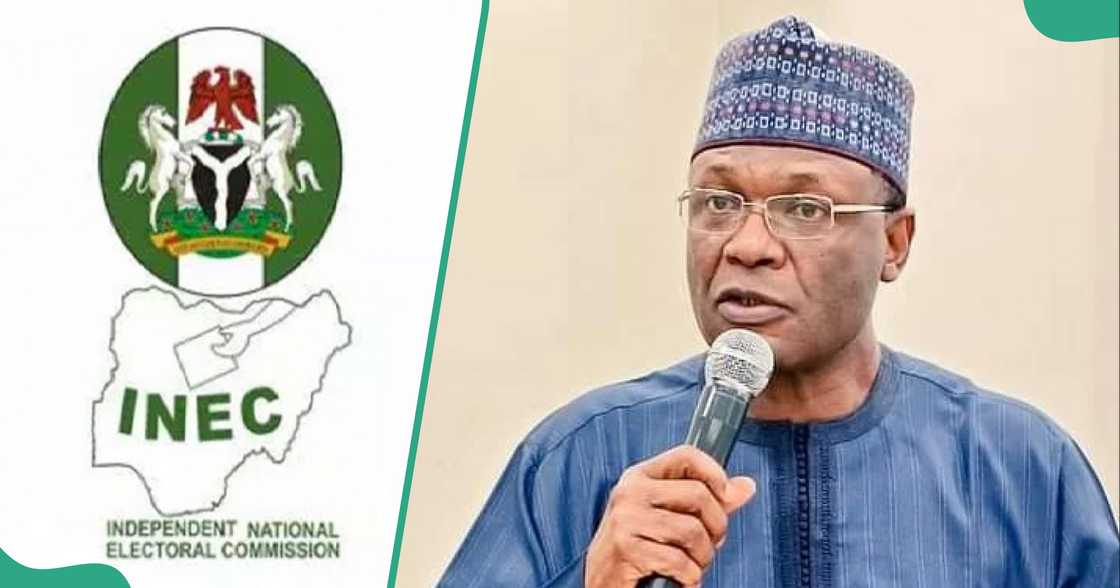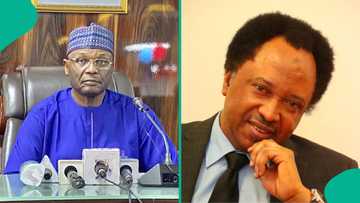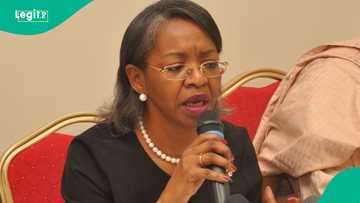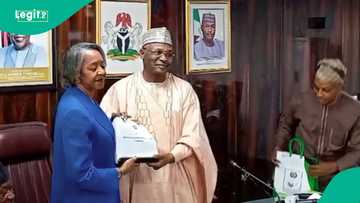INEC: Full Text of Mahmood Yakubu’s Speech as Tenure Ends as Chairman
- A month to the expiration of his tenure as INEC chairperson, Mahmood Yakubu, a professor, has begun his pre-exit leave
- Yakubu, on Tuesday, October 7, also handed over the affairs of the commission to May Agbamuche-Mbu, the most senior national commissioner
- Mrs Agbamuche-Mbu is now the acting chairperson of the commission pending the appointment of a substantive head of the electoral body
Legit.ng journalist Ridwan Adeola Yusuf has over 9 years of experience covering politics, elections, and governance in Nigeria.
FCT, Abuja - Mahmood Yakubu, chairman of the Independent National Electoral Commission (INEC), on Tuesday, October 7, handed over the leadership of the commission to May Agbamuche-Mbu, who will now serve as acting national chairman.
Legit.ng reports that Yakubu made the announcement on Tuesday, October 7, during a meeting with resident electoral commissioners (RECs) at the INEC headquarters in Abuja.

Source: Facebook
Yakubu bows out as INEC boss
Agbamuche-Mbu, who represents Delta state on the commission, is the oldest serving national commissioner.
Below is Prof. Yakubu’s full valedictory speech delivered today, Tuesday, October 7, at his last meeting with RECs:
National Commissioners of INEC
The Resident Electoral Commissioners (RECs)
The Secretary to the Commission
Other Senior Officials of the Commission
The Chairman and Members of the INEC Press Corps
Ladies and Gentlemen
I welcome our Resident Electoral Commissioners (RECs) to the third regular quarterly consultative meeting for the year 2025.
Today’s meeting is holding in the middle of the nationwide Continuous Voter Registration (CVR) which started seven weeks ago. Since then, the Commission has been publishing weekly figures of the exercise with detailed breakdown by States of the Federation, gender, age, occupation and disability. The latest figures published yesterday show that 6,856,979 Nigerians commenced their registration online (the pre-registration option) while 1,216,048 completed the process (the physical or in-person option). The exercise will continue until August 2026 when it will be suspended not later than 90 days before the date fixed for the general election, as provided by law.

Read also
INEC: Sani under fire for saying ex-chair Yakubu gave Nigerians something, “he ruined everything”
As you are aware, there are a number of forthcoming elections. The preparations for some of them are either at advanced or concluding stages. The Anambra State Governorship election is holding next month, followed by Area Council election in the Federal Capital Territory (FCT) in February 2026, the Ekiti State Governorship election in June 2026, and the Osun State Governorship election in August 2026.
In addition to these off-cycle elections, we have already commenced preparations for some of the major activities for the 2027 General Election, while awaiting the enactment of a new Electoral Act. The Bill is currently before the National Assembly. It is expected that electoral reforms contained in the new Act will necessitate further review of our Regulations and Guidelines as well as the Manuals for Elections. Beyond these reviews, the Commission needs to further clean-up the voters’ register, review the locations of some of the polling units and the allotment of voters to them. The management of party primaries is another major area of activity. You may recall that for the last General Election in 2023, the Commission processed the nomination of 20,000 candidates. Furthermore, election logistics involving the procurement, production and transportation of huge quantities of materials by road, air and sea are a monumental undertaking. So too is the recruitment and training of election officials, voter education and engagement with stakeholders. The prevailing insecurity and natural emergencies such as floods in some parts of the country have dislocated many citizens who must be given the opportunity to exercise their franchise. Doing so may require a review of our existing framework for voting by Internally Displaced Persons (IDPs).

Read also
Agbamuche-Mbu: Born in Kano, 4 other facts about new INEC acting chair as Mahmood Yakubu hands over
Over the years, we achieved a lot in responding to challenges and introducing many innovations. We have consolidated the biometric register of voters and replaced many of our manual processes with digital platforms and applications. These include the nomination of candidates, submission of polling and collation agents by political These include the nomination of candidates, submission of polling and collation agents by political parties, accreditation of national and international observers and the media for elections, voter accreditation and result management.
In addition, with the support of development partners, we have introduced various technologies to improve diverse aspects of election management such as easy location of election facilities, management of collation and returning officers, virtual training of electoral staff, management of political parties finances and audits, as well as the overall monitoring of elections using our Election Monitoring and Support Centre (EMSC). Indeed, we have made tremendous progress, but a lot more needs to be done.
Accordingly, and knowing the enormity of the challenges ahead having been privileged to serve the Commission for ten years with only a few more weeks to serve, I have taken a decision and conveyed same as provided by Sec. 306 (1) and (2) of the Constitution of the Federal Republic of Nigeria 1999 (as mended). In the interim, I am handing over to one of the most senior National Commissioners by date of appointment. Following consultation with other National Commissioners, Mrs. May Agbamuche-Mbu will serve in an acting capacity pending the appointment of a substantive Chairman of the Commission. I hope that this will afford the appointing authorities adequate time to appoint a new Chairman. It will also enable the new chairman to settle down quickly to the task of conducting elections and electoral activities in Africa’s most demographically and logistically complex elections.
I want to express my profound appreciation to members of the Commission and our Resident Electoral Commissioners (RECs) for the excellent working relations that we shared. Since 2015, I have worked with 24 National Commissioners and 67 RECs. So also to the staff of the Commission. Those involved in elections or vastly knowledgeable about election management understand what the conduct of elections entails. I will forever cherish the support of successive Secretaries and staff of the Commission nationwide. Together, we innovated and managed the Commission’s enormous responsibilities, sometimes on the verge of breaking down. I also enjoyed tremendous support and goodwill from members of the National Assembly, particularly successive Chairmen and Members of the Committees on Electoral Matters. So too from political parties, the National Peace Committee under our respected former Head of State General Abdulsalami Abubakar GCFR, friends from civil society, the media and the labour unions. I must also appreciate the development partners for their support. The security agencies have been exceptional in securing the environment without which the conduct of elections will be impossible in some locations. I also thank my colleagues in the University system who played critical roles at the various stages of elections. I must also appreciate the National Youth Service Corps (NYSC) without whose participation the management of election at polling unit level will be a nightmare. Young Nigerians serving in the NYSC are among the most educated patriotic and knowledgeable election officials I worked with. I also thank my family for their patience and support throughout the last ten years. Above all, I thank Nigerians for their comments as well as criticisms which encouraged rather than discouraged us to persevere.
Today, we are presenting two books to the public. The first, entitled Election Management in Nigeria, 2015-2025, is a compendium of all the activities carried out in the last ten years under my watch. The second book entitled Innovations in Electoral Technology 2015 – 2025 more specifically dwells on the new technologies introduced by the Commission in the last one decade. The two publications have already been uploaded to our website for public access.
May God continue to bless our country and its democracy.
Source: Legit.ng


